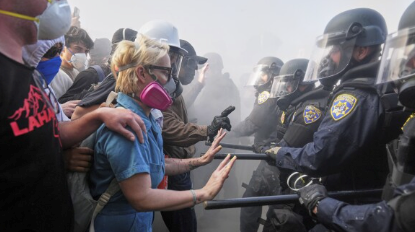June 12 – Los Angeles finds itself at the centre of a brewing crisis that could fundamentally alter how international football operates in America. With the Concacaf Gold Cup and FIFA Club World Cup set to kick off this weekend, the city’s fifth consecutive day of immigration protests has created an unprecedented challenge.
The numbers are staggering: 4,000 National Guard troops and 700 Marines have been deployed across the city, while Immigration and Customs Enforcement (ICE) raids continue to sweep through immigrant communities. This isn’t the backdrop anyone envisioned for showcasing football’s global appeal.
Concacaf’s official statement reflects the delicate balance governing bodies face when politics intrude on sport: “The safety and wellbeing of all participants, fans, and stakeholders is the Confederation’s highest priority.
“We will continue to actively monitor developments as we work towards delivering a world-class tournament that highlights the best of our sport in a safe, inclusive, and enjoyable environment for all.”
The reality on the ground tells a different story. LA Mayor Karen Bass has declared overnight curfews in downtown areas citing vandalism and looting. President Donald Trump’s justification for the military deployment – preventing the city from being “conquered by a foreign enemy” – reveals the inflammatory rhetoric surrounding immigration enforcement.
European fans’ organisations aren’t buying the “everything’s fine” narrative. The Football Supporters Europe group issued a scathing assessment: “The current policing approach in the US is wholly unfit for international sporting events. The continued use of excessive force against peaceful protestors is especially alarming. FIFA must act now.”
The fans’ group goes further, arguing that Trump’s policies “pose a direct threat to the safety and wellbeing of visiting fans.” This isn’t hyperbole – it’s a fundamental question about America’s capacity to host international sport under current conditions.”
Last week’s travel ban affecting 12 countries adds another layer of complexity. Teams and players potentially face restrictions that could compromise tournament integrity. This creates a legal and logistical nightmare for organising bodies already struggling with the political fallout.
Andrea Florence from the Sport & Rights Alliance delivered perhaps the most damning assessment: “If sport governing bodies turn a blind eye to the escalating rights violations in the US, sporting events risk not only reflecting those abuses – but actively deepening them.”
The most volatile scenario involves Mexico’s Gold Cup opener at SoFi Stadium. When El Tri last played in Los Angeles, over 70,000 fans packed the venue for the Concacaf Nations League. The demographic breakdown of that crowd – heavily Mexican and Mexican-American – creates obvious tension with current immigration enforcement priorities.
If ICE views the tournament as an opportunity for high-profile raids, the consequences could be catastrophic. Mass arrests during or around matches would create international incidents that dwarf typical sporting controversies.
This crisis exposes fundamental contradictions in how America presents itself to the world through sport. The country that positions itself as the leader of the free world is simultaneously conducting what human rights groups describe as “enforced disappearances and arbitrary detention.”
For FIFA and Concacaf, the Los Angeles situation represents a test case for their stated commitments to human rights and inclusive sport. Their response will signal whether governing bodies prioritise moral leadership or financial convenience.
Contact the writer of this story, Nick Webster, at moc.l1749799702labto1749799702ofdlr1749799702owedi1749799702sni@r1749799702etsbe1749799702w.kci1749799702n1749799702

